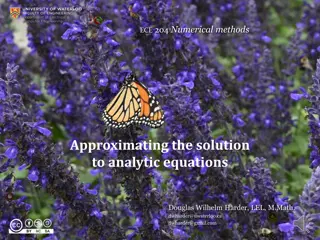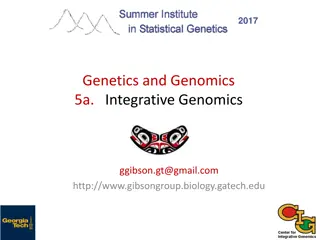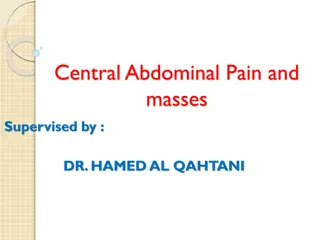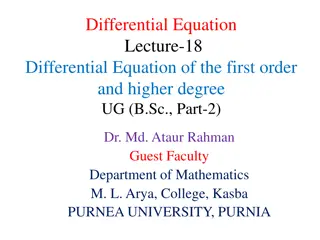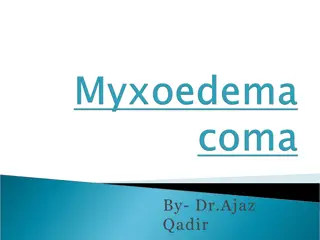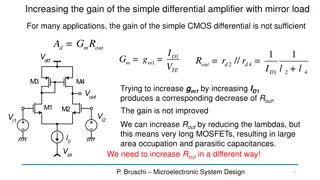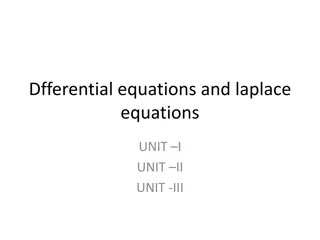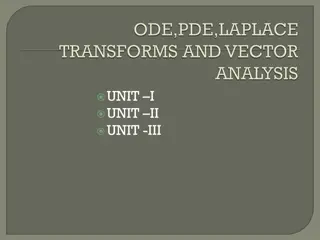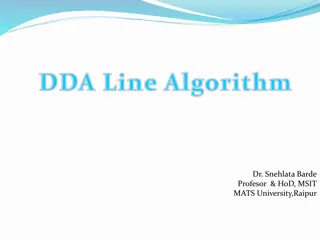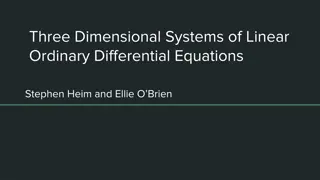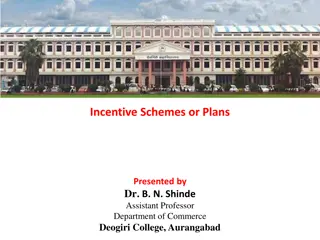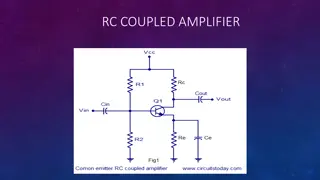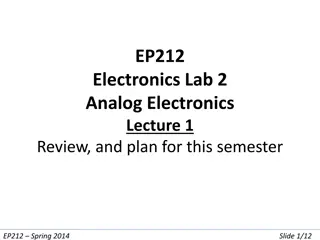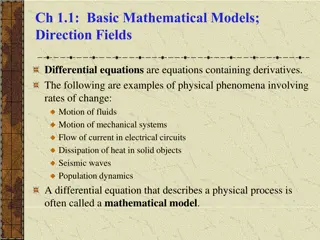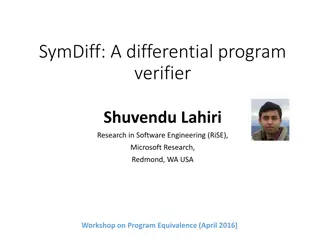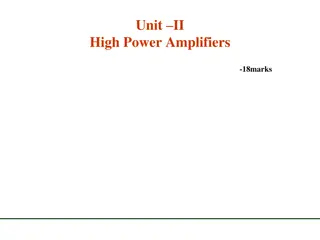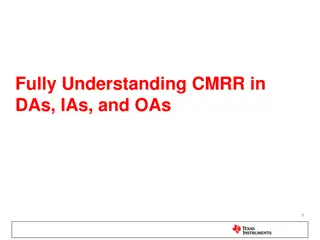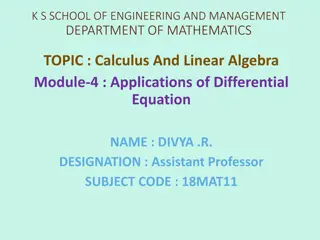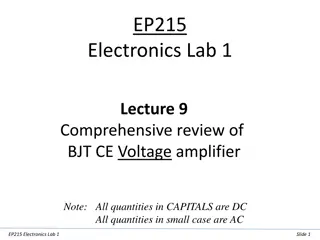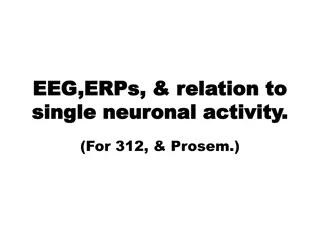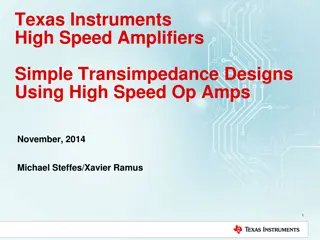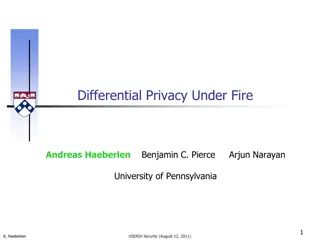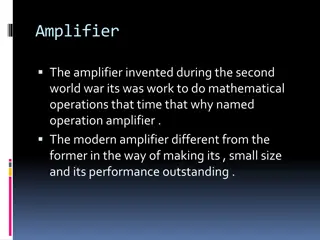Differential white blood cell count
Differential white blood cell count, also known as a leukocyte count, is a crucial test to determine the different types of white blood cells present in the blood. The cells are classified into granulocytes (neutrophils, eosinophils, basophils) and agranulocytes (lymphocytes, monocytes). Blood smear
3 views • 21 slides
Approach to Depression in Primary Care by Dr. Jon Davine
In this presentation, Dr. Jon Davine discusses the approach to depression in primary care, covering topics such as differential diagnosis, antidepressant medication selection, augmentation techniques, and treatment options like ECT and TMS. The sad state is explored through differential diagnoses, i
5 views • 56 slides
Understanding Numerical Methods for Approximating Analytic Equations
Introduction to approximating solutions to analytic equations, focusing on differential equations, integral equations, and integro-differential equations. Exploring ordinary and partial derivatives, differential and integral equations, and the involvement of unknown functions and their derivatives a
2 views • 15 slides
Exploring Genetics and Genomics in Integrative Biology
Delve into the world of genetics and genomics through the lens of integrative biology, investigating the differences between cell types, the rationale for gene expression profiling, and the analysis of differential gene expression in various diseases. Uncover the significance of gene ontology, co-ex
0 views • 22 slides
Understanding Central Abdominal Pain and Masses in Clinical Practice
Abdominal pain evaluation involves considering various differential diagnoses such as appendicitis, small bowel obstruction, and mesenteric ischemia. By categorizing pain as visceral, parietal, referred, or radiating, healthcare providers can better understand the underlying pathology. The history o
0 views • 57 slides
Differential Equations of First Order & Higher Degree: Lecture 18
This lecture covers differential equations of first order but not of the first degree, general forms of such equations, methods for solving them, and examples of differential equations to be solved. The content includes detailed explanations, equations, solutions, and problem-solving techniques.
0 views • 9 slides
Understanding Differential Leucocyte Count for Blood Disorders
Differential Leucocyte Count (DLC) is crucial for diagnosing blood-related disorders by analyzing the distribution and morphology of white blood cells. Dr. Versha Prasad explains the significance, normal values, and various conditions like neutrophilia, lymphocytosis, monocytosis, and basophilia. Th
1 views • 15 slides
Understanding WBC Differential Count in Blood Analysis
WBC (white blood cell) count is essential in assessing a patient's health. A differential count helps determine the percentage of different types of white blood cells. This analysis can provide important insights into various health conditions like infections, allergies, and systemic illnesses. The
1 views • 9 slides
Understanding Myxedema Coma: Symptoms, Diagnosis, and Management
Myxedema coma is a rare, life-threatening condition associated with decompensated hypothyroidism. It presents with altered mental status, low body temperature, and various metabolic abnormalities. This article explores the primary symptoms, differential diagnosis, and management of myxedema coma bas
0 views • 20 slides
Understanding Differential Leveling in Surveying
Differential leveling is a crucial aspect of surveying that involves determining the elevation of points with respect to a reference datum. This process includes various key elements such as benchmark, back sight, fore sight, and change points. By utilizing methods like the Height of Instrument and
1 views • 12 slides
Privacy-Preserving Analysis of Graph Structures
Explore the world of graph structures and differential privacy in data publishing networks, focusing on preserving privacy while releasing structural information about graphs. Differential privacy techniques such as edge privacy and subgraph counts are discussed in detail, highlighting the challenge
0 views • 20 slides
Enhancing Information Retrieval with Augmented Generation Models
Augmented generation models, such as REALM and RAG, integrate retrieval and generation tasks to improve information retrieval processes. These models leverage background knowledge and language models to enhance recall and candidate generation. REALM focuses on concatenation and retrieval operations,
1 views • 9 slides
Techniques to Increase Gain in a Simple Differential Amplifier
Explore methods to boost the gain of a simple CMOS differential amplifier by replacing the current mirror with a cascode mirror, adding a common-gate stage, and employing a cascode differential amplifier. These techniques help improve Rout without extensive use of long MOSFETs, optimizing the amplif
2 views • 30 slides
Understanding Differential Equations: Types, Classification, and Solutions
Differential equations are mathematical equations that relate independent and dependent variables through differential coefficients. They can be classified as ordinary or partial, based on the types of derivatives involved. The order and degree of a differential equation, as well as its linearity an
3 views • 26 slides
Understanding Differential Equations in Economics Honours
Differential equations, introduced by Newton and Leibniz in the 17th century, play a key role in economics. These equations involve derivatives and represent implicit functional relationships between variables and their differentials, often related to time functions. The order and degree of a differ
1 views • 16 slides
Introduction to Differential Equations and Laplace Equations
Understanding differential equations of various orders, solving methods, linear and non-linear equations, ordinary and partial differential equations, definitions of solutions, and general vs. particular solutions in the context of Differential Equations and Laplace Equations.
1 views • 20 slides
Understanding Differential Equations: Basics to Applications
Differential equations are fundamental in mathematics, with various types such as first-order, partial, and Clairaut's equations explored in this content. The content covers general equations, solutions, and examples, providing insights into linear and higher-order equations with constant coefficien
0 views • 20 slides
Digital Differential Analyzer (DDA) Algorithm in Computer Graphics
In computer graphics, the Digital Differential Analyzer (DDA) Algorithm is utilized as the basic line drawing algorithm. This method involves interpolation of variables between two endpoints to rasterize lines, triangles, and polygons efficiently. The algorithm requires inputting coordinates of two
0 views • 9 slides
Understanding Partial Differential Equations of Second Order
Exploring the concepts of second-order partial differential equations in mathematics, including the general form, linear equations with variable coefficients, and equations with constant coefficients. Learn about integral solutions, examples, and techniques for solving these equations with detailed
0 views • 21 slides
Neonatal Vomiting: Causes, Diagnosis, and Differential Diagnosis
Neonatal vomiting can be a concern when presenting with bile-stained or blood-stained vomit, projectile vomiting, or associated with weight loss and failure to grow. Various non-surgical and surgical conditions like Pyloric Stenosis can lead to vomiting in neonates. Common causes include Mid-gut vol
0 views • 16 slides
Understanding Three-Dimensional Systems of Linear Ordinary Differential Equations
Explore the concepts of three-dimensional linear systems of ordinary differential equations, including techniques for finding eigenvalues and the general solutions. Learn how to determine characteristic polynomials for 3x3 matrices and identify sink, source, and saddle points in 3D systems.
0 views • 20 slides
Analysis of Taylor's Differential Piece Rate System in Incentive Schemes
The Differential Piece Rate System introduced by Taylor in the field of scientific management aimed to reward efficient workers with higher piece rates for higher production while penalizing slow workers with lower rates. This system, based on time and motion studies, incentivized workers to complet
0 views • 14 slides
Understanding Practical Op-Amp Circuits: Inverting, Noninverting, and More
Explore practical op-amp circuits such as inverting amplifier, noninverting amplifier, unity follower, summing amplifier, and integrator. Learn how to calculate output voltages for various configurations and understand their applications with examples.
0 views • 17 slides
Understanding RC Coupled Amplifiers and Transistor Basics
Amplification is the process of increasing signal strength without changing its characteristics. An RC coupled amplifier is a multistage amplifier using resistors and capacitors. Transistor amplifiers amplify signals based on transistors with different configurations. The common emitter configuratio
0 views • 23 slides
Analog Electronics Review and Semester Plan for EP212 Spring 2014
This presentation reviews concepts in analog electronics, focusing on operational amplifiers, feedback, signal measurement in the presence of noise, transistor amplification, differential operation constraints, and component matching in electronics labs. The semester plan includes topics such as dis
1 views • 11 slides
Understanding Differential Equations in Physical Phenomena
Differential equations play a crucial role in modeling physical phenomena involving rates of change like fluid motion, mechanical systems, and heat dissipation. This content explores examples of differential equations in motion and provides insights on sketching direction fields using tools like Map
0 views • 11 slides
Exploring SymDiff: A Differential Program Verifier
SymDiff is a platform that leverages program verification to analyze program differences, focusing on differential verification to verify properties of program variances rather than the program itself. The architecture, language subset, and modeling imperative programs/heaps are key components discu
1 views • 18 slides
Understanding High Power Amplifiers with BJT for Efficient Performance
Explore the world of high-power amplifiers utilizing BJT technology, focusing on factors like linearity, efficiency, and maximum power capability. Learn about different amplifier classes - A, B, AB, and C - each with unique operating characteristics. Discover the significance of amplifier efficiency
0 views • 22 slides
Understanding CMRR in Differential Amplifiers
Differential input amplifiers, including operational, instrumentation, and difference amplifiers, play a crucial role in amplifying differential signals while rejecting common-mode noise. The Common-Mode Rejection Ratio (CMRR) is a key parameter in these amplifiers, indicating their ability to suppr
0 views • 48 slides
High-Efficiency Power Amplifier Design for 190-210GHz Range
Optimizing for high efficiency at OP1dB, this work presents a power amplifier operating in the 190-210GHz range with an output power of 17.7-18.5dBm and PAE of 6.9-8.5%. Utilizing a 250nm InP HBT process, the amplifier integrates four stages and demonstrates a gain of approximately 23dB. Key design
0 views • 26 slides
Applications of Differential Equations in Engineering and Mathematics
Exploring the practical applications of differential equations, specifically focusing on Newton's Law of Cooling and Orthogonal Trajectories. The concept of exact differential equations and their solutions, along with real-life examples demonstrating temperature changes over time, are discussed. Und
0 views • 11 slides
Comprehensive Review of BJT CE Voltage Amplifier in Electronics Lab
This lecture provides a comprehensive review of the BJT CE voltage amplifier circuit, starting with theoretical concepts and moving towards practical implementations. It covers the operation of the BJT as a switch, the addition of resistors for current control, DC design considerations, AC voltage g
0 views • 19 slides
Understanding the Relationship between EEG, ERPs, and Single Neuronal Activity
This detailed information discusses the relationship between EEG, ERPs, and single neuronal activity, exploring how electrodes record signals based on tip diameter and biological amplifier filter settings. It delves into parameters that determine what an electrode records, highlighting the importanc
0 views • 56 slides
Understanding Differential Privacy in Statistical Analysis
Gain insight into the concept of differential privacy in statistical analysis through key terminologies, foundational ideas, and practical examples. Explore the balance between data privacy and statistical quality, and learn how differential privacy serves as a mathematical guarantee to protect indi
1 views • 28 slides
Dynamic Function for Basal Area of Trees Derived from Differential Equation
Mathematical methods presented by Braun and Simmons are used to derive a dynamic function for the basal area of individual trees from a production-theoretically motivated autonomous differential equation. The differential equation and general dynamic function are described, highlighting the relation
0 views • 45 slides
Solving Differential Equations: Methods and Techniques
Learn how to solve differential equations using methods like separation of variables and sketch families of solution curves. Understand the process of finding general and particular solutions to equations, and explore a variety of exercises and examples to enhance your understanding. Master the art
0 views • 16 slides
High-Speed Amplifiers: Design Techniques and Considerations
This detailed document explores the design aspects of high-speed amplifiers, focusing on transimpedance designs using high-speed op-amps. It covers basic and advanced design issues, frequency response analysis, and key considerations for achieving desired performance. The content emphasizes simplifi
0 views • 44 slides
The Challenges of Protecting Privacy with Differential Privacy
The article discusses the motivation behind using differential privacy to protect sensitive data while enabling useful queries. It highlights the promise of differential privacy, challenges faced, attacks on existing systems like PINQ and Airavat, and introduces a defense system called The Fuzz. The
0 views • 24 slides
Evolution of Amplifiers: From WWII to Modern Integrated Circuits
Amplifiers have come a long way since their invention during WWII for mathematical operations. The modern amplifier is compact, high-performing, and integrated with transistors, resistors, and capacitors on a single chip. The properties of operation amplifiers, input modes, and differential inputs a
0 views • 10 slides
FX-Audio DAC X6 Overview and Teardown Analysis
FX-Audio DAC X6 is a digital-to-analog converter with a built-in amplifier designed for higher impedance headphones like the Drop K7XX. The device features multiple inputs including Optical, USB, and Digital Coax, with outputs to line-out RCA ports and headphones. A breakdown of the internal compone
0 views • 4 slides


